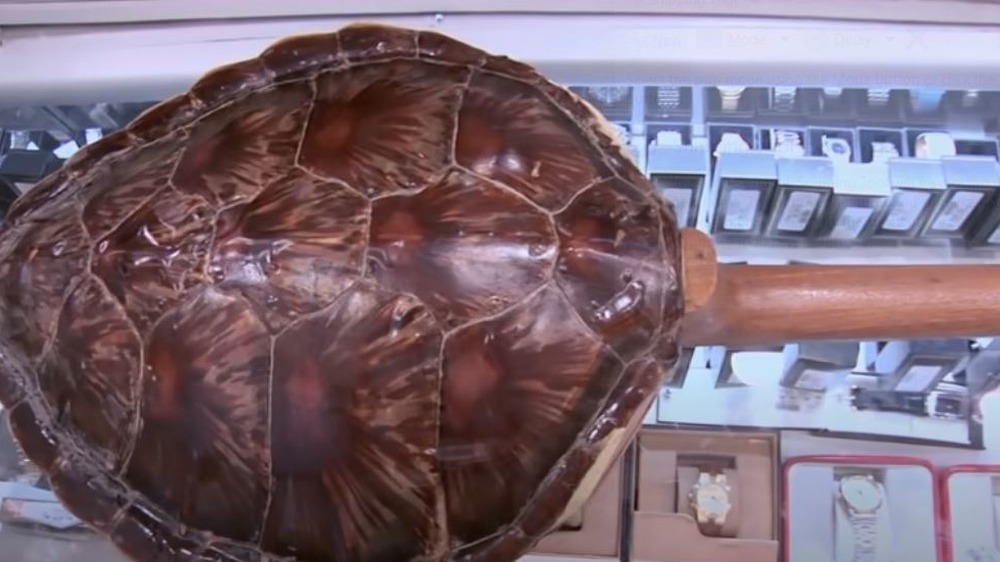The Guitar Sale That Could Have Landed Pawn Stars In Deep Trouble
One of the fun things about Pawn Stars is that you never know what someone is going to bring in to trade for cash. Some of these items can be entertaining, some can be weird, and some are just unexpected. Plenty of these transactions are educational, as viewers may learn some eclectic and esoteric history about an object to add to their database of trivia.
As for pawn shops, they operate under certain restrictions, including national, state, local, and international law. In season 7 of the show, one iffy object was brought in that required a bit of expert consultation to determine if those laws would allow this object to be purchased. In the end, Rick Harrison opted not to buy — and that was probably a smart move.
When the object was first brought in by a customer, the seller, a man named Jon, explained, "I wasn't sure whether or not I could legally sell it." From the top side, Harrison couldn't tell what the issue was — it looked like a round, wooden guitar with decorative trim. Turning it over, however, the problem was clear — the object was made from tortoiseshell.
Harrison brought in an expert, Jesse Amoroso from Cowtown Guitars. Amoroso pointed out that the instrument was clearly made with sea turtle shell, which requires the death of the animal to remove. He further noted that instruments made from turtles were big after World War II, and that bluegrass musicians prefer a tortoiseshell pick because of its sound.
Here's why Harrison ultimately decided to pass on the purchase.
International and federal laws prohibit trade in sea turtle shells
Amoroso admitted that while owning the guitar might not be problematic, he couldn't be certain whether selling it would be another matter. A guitar like this that was made well could be worth some money, he concluded, but, as he put it, "Honestly... I wouldn't touch this with a ten-foot pole."
That's because of CITES, the Convention on International Trade in Endangered Species, passed in 1975. Prior to the signing of this agreement by 173 countries, the population of hawksbill sea turtles had declined more than 90 percent in 100 years, with hundreds of thousands of turtles being killed each year to create decorations and adornments and to provide a protein source. By 1981, all sea turtle species had been placed under the protection of Appendix 1 of CITES, which forbids most trade save for exceptional, non-commercial circumstances (such as scientific research) with a permit.
Unfortunately, international and interstate black market trade continues, often fueled by online sellers or ignorant tourists bringing contraband in from places like the Caribbean. Under CITES, permits or other documentation are required for those who want to commercially trade items made from threatened animals and plants, even if they date to before 1975. Under the Federal law the Endangered Species Act (ESA), legality varies, but an "antique" item must be at least 100 years old to bypass import/export rules. Only the Marine Mammal Protection Act (which doesn't apply to turtles) makes allowances for items that predate the 1972 law, but only if the animal in question doesn't have further protection under the ESA, according to the U.S. Fish & Wildlife Service.
Even traveling with the aforementioned guitar picks is risky, as international and interstate commerce is specifically targeted. And in 2017, a Florida man trying to sell his 30-year-old collection was cited at a local festival and had his sea turtle items confiscated (via The Bradenton Herald). As Pawn Stars must report every transaction to the police, officials could have quickly flagged the guitar before it sold.
Basically, Harrison's Gold & Silver Pawn Shop may have avoided prosecution and punishment by making a good decision here.

